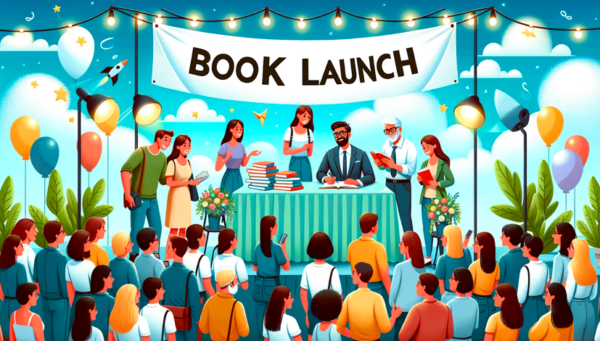In 2023, the landscape for authors continues to evolve rapidly, driven by technological advancements, shifting market dynamics, and changing consumer reading habits. These changes offer both new opportunities and challenges that significantly impact an author’s potential earnings. Understanding the various factors influencing income is crucial for both new and seasoned writers looking to navigate this complex environment.
Traditionally, author income has been predominantly generated through advances and royalties from publishers. However, the rise of self-publishing platforms has democratized the field, allowing authors to bypass traditional gatekeepers and access the market directly. This shift has not only affected how authors publish but also how they connect with readers and monetize their work. Digital platforms such as eBooks and audiobooks have become increasingly significant, changing not just the format of books sold but also how they are consumed.
Moreover, genre and current trends continue to play pivotal roles in determining sales. Genres like fantasy, romance, and thriller often see higher sales volumes and dedicated fanbases willing to pay for new content. Additionally, marketing and promotional strategies have become indispensable tools in an author’s arsenal to boost visibility and enhance sales. With the global nature of the book market, geographical and demographic factors also dictate earning potentials, influencing not only what authors write but how they reach their audiences.
In this article, we will explore these key factors in detail, including traditional versus self-publishing routes, the impact of digital platforms, the influence of genre and market trends, and effective marketing strategies. Additionally, we will delve into how authors can diversify their income streams beyond book sales, ensuring a more stable and sustainable financial future. Understanding these elements is essential for any author aiming to succeed in the competitive landscape of 2023.
What Influences Earnings in 2023?
In the 21st century, Authors face a rapidly evolving landscape influenced by technological advancements, changing market dynamics, and shifting consumer reading habits. Several key elements significantly impact author income factors in 2023, offering both opportunities and challenges.
Publishing Route: Authors must decide between traditional and self-publishing. Traditional publishing offers stability with advance payments and professional support but lower royalties (10-15%). Self-publishing provides higher royalties (40-70%) and creative control but involves upfront costs and greater marketing responsibility.
Genre and Trends: The choice of genre plays a crucial role, with genres like romance, thriller, and fantasy typically achieving higher sales. Current trends, such as the rise of audiobooks and eBooks, serial publications, and the influence of social media platforms like TikTok, also shape an author’s income potential.
Digital Platforms: Digital platforms have revolutionized publishing, allowing authors to reach global audiences. eBooks and audiobooks offer substantial royalty rates and accessibility. Online serials on platforms like Wattpad provide continuous revenue streams and reader engagement.
Marketing and Promotion: Effective marketing strategies are essential for visibility and sales. Building a strong author brand, engaging in direct marketing through email newsletters and social media, and utilizing paid advertising can significantly enhance an author’s reach.
Geographic and Demographic Factors: Understanding the geographic and demographic preferences of readers helps authors tailor their content and marketing strategies, boosting relevance and sales.
Diversification of Income: To ensure financial stability, authors should diversify their income through speaking engagements, workshops, and merchandise. This not only enhances earnings but also deepens reader engagement.
By understanding and strategically navigating these factors, authors can optimize their earnings and achieve long-term success in the competitive 2023 publishing landscape.
Start Your Publishing Journey FOR FREE
Traditional vs. Self-Publishing Routes
The decision between traditional publishing and self-publishing is a critical one for authors, with significant implications for their career trajectory and financial outcomes. Each route offers distinct advantages and challenges, especially in terms of potential income streams. In traditional publishing, book royalties typically range from 10% to 15% per book sold, which can significantly contribute to author earnings. Working with a major publisher not only increases market access but also provides the benefits of a larger marketing budget and the potential for substantial book deals.
On the other hand, authors who self-publish can expect higher royalties, often between 40% to 60% of the book’s sale price, highlighting the financial benefits of this route. However, it’s important to contrast these potential earnings with traditional publishing earnings, where the stability and resources of established publishing houses can play a crucial role in an author’s financial success.
Traditional Publishing for Traditionally Published Authors
Advantages:
- Advance Payments: Traditional publishers often offer advances against royalties, providing authors with upfront payments. This can be a significant financial boon, especially for new authors who haven’t yet established a steady income stream from their writing. Understanding traditional publishing earnings is crucial, as these advances are a key factor in an author’s overall earnings, though they require careful consideration of the potential impact on future royalties.
- Professional Support: Authors benefit from a range of professional services at no upfront cost, including editing, design, marketing, and distribution. This support can enhance the quality and reach of their book, potentially leading to higher sales.
- Market Access: Traditional publishers have established relationships with retailers and reviewers, ensuring books receive shelf space and media attention that can be challenging to achieve independently. Having a traditionally published book with a major publisher can also significantly enhance an author’s financial and promotional prospects, leveraging the publisher’s marketing power and distribution networks.
Disadvantages:
- Lower Royalties: Royalty rates in traditional publishing are typically lower than in self-publishing. After the advance, authors usually earn between 10% and 15% of the book’s retail price as royalties.
- Less Control: Authors often have limited control over aspects like book design and pricing. The publishing house’s timeline can also be lengthy, sometimes taking years from manuscript acceptance to book release.
- Contractual Commitments: Contracts can include clauses that limit authors’ rights, such as those concerning future works or adaptations.
Self-Publishing for Authors
Advantages:
- Higher Royalties: Self-publishing platforms like Amazon’s Kindle Direct Publishing offer royalties up to 70% of the retail price, significantly higher than traditional publishing rates, which typically offer between 10% to 15% royalties. This stark contrast highlights the potential for higher earnings through self-publishing, as authors can retain a larger portion of their sales revenue. The success stories of authors who have chosen to self-publish underscore the financial benefits and autonomy over one’s work, contrasting with the more restrictive financial and creative conditions of traditional publishing.
- Creative Control: Authors have complete control over every aspect of their own book project, including content, cover design, formatting, pricing, and marketing strategies. This autonomy allows for instant adjustments based on reader feedback and market trends.
- Speed to Market: Self-published books can be brought to market much faster than traditionally published authors’ books can. Often within weeks of finalizing the manuscript. This quick turnaround can be particularly advantageous in trending genres or topical content.
Disadvantages:
- Upfront Costs: Unlike traditional publishing, self-publishing requires authors to bear the cost of editing, design, and marketing their book, which can be prohibitively expensive without a guarantee of recouping these investments.
- Distribution Challenges: Self-published authors often struggle to get their books into physical bookstores and may rely heavily on online sales, which can limit exposure to potential readers.
- Marketing Responsibility: The burden of marketing a published book falls entirely on the author. Without effective marketing strategies, even the best-written books can languish unseen among the vast offerings of digital marketplaces.
Earnings Considerations
Ultimately, the choice between traditional and self-publishing significantly impacts potential earnings. Traditional publishing may offer a more stable initial income through advances and professional marketing support, potentially leading to broader distribution and higher long-term sales. On the other hand, self-publishing provides higher per-book earnings and greater flexibility, which can be more lucrative for authors who actively manage their book promotions and sales strategies.
Authors must carefully weigh these factors against their personal goals, resources, and market understanding to choose the best publishing route for their works in 2023. This decision will influence not just their earnings but also their overall career satisfaction and development.
The Role of Genre and Trends
Choosing the right genre can significantly impact an author’s income, as some genres tend to perform better commercially than others. Additionally, trends within the traditional publishing house and industry can heavily influence an author’s visibility and sales, making an understanding of these elements crucial for maximizing earnings.
Impact of Genre on Income
Certain genres have historically shown strong sales figures and dedicated readerships, which can translate into more consistent earnings for authors. For example, romance novels consistently top the sales charts, accounting for a substantial portion of the ebook market. Mystery, thriller, and crime novels also see robust sales, often because they appeal to both casual readers and dedicated fans who follow specific series or authors.
Conversely, literary fiction, while prestigious, often yields lower immediate returns unless it garners critical acclaim or wins literary awards. Similarly, niche genres such as poetry and certain subcategories of non-fiction may struggle to achieve high sales volumes, making them potentially less lucrative for authors seeking significant income from book sales alone.
Trends Influencing Sales and Visibility
1. Rise of Audiobooks and eBooks: The growing popularity of digital formats, particularly audiobooks, has reshaped income opportunities. Genres that translate well into these formats, such as thrillers and science fiction, can benefit from increased accessibility and changing consumer preferences towards digital consumption.
2. Serial Publications: Online platforms that allow for serialized publishing, such as Wattpad or Amazon’s Kindle Vella, have gained traction, influencing how genres like young adult fiction and romance are consumed. Authors can build a following and generate revenue on a chapter-by-chapter basis, which can provide regular income and reader feedback during the writing process.
3. Influence of Social Media and BookTok: Social media platforms, especially TikTok under the hashtag #BookTok, have become significant trendsetters in the publishing world. Books that gain traction on these platforms can see a surge in sales, regardless of when they were originally published. This trend highlights the importance of social media savviness for authors, particularly in genres popular among younger readers, such as fantasy and the genre of young adult.
4. Diversity and Inclusion: There is a growing demand for books that represent a diverse range of experiences and voices. This shift encourages authors to explore a broader spectrum of themes and characters, particularly in genres such as YA, literary fiction, and memoirs, aligning with cultural movements and potentially opening up new markets.
Understanding these genre dynamics and staying attuned to current trends is key for authors aiming to optimize their earnings. By strategically choosing a genre and aligning with market trends, authors can significantly enhance their visibility, attract a dedicated readership, and, consequently, increase their potential income.
Start Your Publishing Journey FOR FREEImpact of Digital Platforms
In 2023, digital platforms continue to reshape the publishing landscape, providing authors with unprecedented opportunities to reach global audiences and maximize their earnings. The rise of eBooks, audiobooks, and online serials has not only changed the way content is consumed but also dramatically influenced the financial outcomes for authors depending on their platform choices.
eBooks
Influence on Reach and Royalties:
eBooks have democratized the publishing process, allowing authors to bypass traditional gatekeepers and access readers directly through platforms like Amazon Kindle, Apple Books, and Google Play. The primary advantage of eBooks is the high royalty rates, often between 60% and 70% of the retail price, significantly higher than the typical 10% to 15% from traditional publishing. Additionally, the global reach of digital marketplaces means that authors can connect with readers worldwide, significantly expanding their potential audience beyond what physical distribution can achieve.
Strategic Considerations:
To maximize eBook earnings, authors need to focus on effective SEO practices, compelling cover design, and competitive pricing strategies. Also, participating in promotional events and sales can dramatically increase visibility and sales volume.
Audiobooks
Influence on Reach and Royalties:
Audiobooks have surged in popularity, catering to consumers who prefer listening over reading. Platforms like Audible, Google Audiobooks, and Apple Audiobooks offer robust distribution networks. Royalties for audiobooks can vary widely but generally offer competitive rates, especially if authors choose to produce and distribute their work independently.
Strategic Considerations:
Producing an audiobook involves upfront costs, including professional narration and production. However, the investment can pay off by tapping into the growing market of listeners who enjoy consuming content on the go. Moreover, audiobooks can be a lucrative avenue for genres that perform exceptionally well in audio format, such as thrillers and self-help.
Online Serials
Influence on Reach and Royalties:
Online serial platforms like Wattpad or Kindle Vella allow authors to publish their stories in episodes, gaining real-time feedback and building a dedicated readership. This model can create a steady income stream as readers pay to unlock new episodes. It also facilitates engagement through comments and discussions, enhancing reader loyalty and promoting viral marketing.
Strategic Considerations:
Success on serial platforms requires consistent updates and active engagement with readers. Authors need to be adept at cliffhangers and pacing to keep readers returning for each new installment. Additionally, leveraging social media to drive attention to serialized content can significantly boost reader numbers and revenue.
General Considerations Across Platforms
1. Data Analytics: Most digital platforms provide detailed analytics on sales and reader engagement. Authors can use this data to understand their audience better and tailor their marketing and content strategies accordingly.
2. Marketing Synergy: Combining the presence across multiple platforms can create synergies that enhance overall visibility and income. For example, releasing an eBook alongside an audiobook can cater to different consumer preferences and increase the overall sales footprint.
3. Global Access: Digital platforms break down geographical barriers, offering authors a worldwide audience. However for independent publishers, this also means increased competition, highlighting the need for distinctiveness in content and presentation.
The choice of digital platform significantly impacts an author’s reach and royalties. By strategically leveraging the strengths of each platform and aligning them with their content and audience preferences, authors can significantly enhance their visibility and income potential in the digital age.
Marketing and Promotion Strategies
In the competitive landscape of 2023, effective marketing and promotion strategies are essential for authors to distinguish their work and enhance both visibility and sales. Central to these efforts are author branding and direct marketing, which allow authors to create a unique presence and foster direct connections with their audience.
The Importance of Author Branding
Author branding involves creating a unique image and consistent voice across all platforms and publications, helping authors stand out in a crowded market. A strong brand resonates with a specific target audience, making it easier for readers to identify and remain loyal to an author’s works.
Strategic Considerations:
1. Consistent Messaging: Authors should ensure that their website, social media profiles, book covers, and promotional materials all convey a consistent message and aesthetic. This uniformity helps reinforce their brand and makes their work instantly recognizable.
2. Personal Connection: Authors can enhance their brand by sharing personal stories, insights into their writing process, and behind-the-scenes content. This not only humanizes them but also builds deeper connections with readers.
3. Niche Targeting: Authors should identify and target a niche market where their voice and content can particularly stand out, allowing for more focused and effective marketing efforts.
Direct Marketing Strategies
Direct marketing allows authors to engage with readers directly, using tools and platforms that facilitate immediate and personal interaction. This approach can significantly increase reader engagement and loyalty, driving both initial and repeat sales.
Effective Direct Marketing Channels:
1. Email Newsletters: Building an email list is one of the most powerful tools at an author’s disposal. It provides a direct line to readers for promoting new releases, sharing exclusive content, and announcing events. Regular updates can keep readers engaged and interested in the author’s work.
2. Social Media Engagement: Platforms like Instagram, Twitter, and Facebook allow authors to reach a large audience quickly. More interactive platforms like TikTok and YouTube can also be used to create engaging content that boosts visibility.
3. Paid Advertising: Targeted ads on social media or search engines can effectively reach potential readers. Platforms like Facebook and Google offer sophisticated targeting options to hone in on specific demographics, interests, and behaviors.
Start Your Publishing Journey FOR FREEEnhancing Visibility and Sales
To translate marketing efforts into visibility and sales, authors need to employ a mix of traditional and digital tactics tailored to their market and reader demographics.
Comprehensive Strategies:
1. Book Launches and Signings: Organizing events around new releases can generate buzz and encourage initial sales spikes. These can be physical events in local bookstores or virtual events, which have grown in popularity.
2. Partnerships and Collaborations: Collaborating with other authors, influencers, or brands can reach different or larger audiences. Partnerships can include joint promotions, guest blogging, or social media exchanges.
3. Promotions and Discounts: Temporary price reductions or promotions, such as giving away a free chapter or offering the first book in a series at a reduced price, can attract new readers and encourage purchases across a series.
4. Utilizing Analytics: By analyzing sales data and reader feedback, authors can refine their marketing strategies, focusing on the most effective channels and messages that drive sales.
In conclusion, a strategic approach to marketing and promotion is vital for authors in 2023. By developing a strong author brand and engaging directly with their audience, authors can significantly enhance their visibility and sales, securing a successful position in the dynamic publishing industry.
Geographic and Demographic Factors
Understanding geographic and demographic factors is essential for authors to effectively tailor their marketing strategies and optimize their earnings. The location of an author and the demographic characteristics of their target audience can significantly influence both the approach to selling books and the resultant financial success.
Influence of Geographic Location
The geographic location of an author can impact access to certain publishing markets and promotional opportunities. For instance, authors based in major literary hubs like New York or London may have better access to leading publishers, literary agents, and industry events that can boost their careers. Additionally, the cultural context of an author’s location can influence the thematic elements of their writing, which can resonate well locally but may need adaptation to suit international audiences.
Strategic Considerations:
1. Local Markets: Authors should consider the preferences of local readers when choosing themes and settings to increase relatability and sales. For example, novels set in recognizable local settings can appeal more to readers from that area.
2. Global Reach: Authors looking to expand globally must understand the cultural nuances and reading preferences of international markets. Translations, cultural adaptations, and partnerships with local publishers can be crucial.
Demographic Targeting
Demographics such as age, gender, income, education level, and interests define an author’s primary audience. Tailoring content and marketing to these specific characteristics can dramatically increase an author’s appeal and sales.
Strategic Considerations:
1. Young Adult Market: This demographic tends to be very active online, especially on platforms like Instagram and TikTok. Authors targeting this group often benefit from engaging directly through these channels, using visuals and interactive content.
2. Adult Non-Fiction: This audience may value depth, accuracy, and professionalism. Authors can connect by participating in or hosting webinars, lectures, and panel discussions, often leveraging professional networks like LinkedIn.

Diversification of Income Streams
For authors in 2023, relying solely on book sales for income can be precarious due to the fluctuating nature of the publishing market. Diversifying income streams by exploring additional sources such as speaking engagements, workshops, and merchandise can provide financial stability and increase overall earnings.
In addition to these strategies, authors should consider the importance of being able to write multiple books as a means of income diversification. Leveraging AI writing tools can enable authors to quickly and efficiently produce a series of books, thereby maintaining a steady income stream. This approach not only helps in keeping up with the demand for new content but also allows authors to tap into various genres or niches, further broadening their market reach and potential revenue sources.
Start Your Publishing Journey FOR FREESpeaking Engagements
Authors can leverage speaking engagements at conferences, universities, and literary festivals to enhance their visibility and credibility. These engagements often offer compensation, travel allowances, and the opportunity to sell books directly to attendees. Furthermore, speaking can position an author as an expert in their genre or subject matter, opening doors to consultancy roles or recurring speaking opportunities.
Strategic Considerations:
1. Establishing Authority: Authors should focus on building a strong portfolio of published work and public appearances to be considered for speaking opportunities.
2. Networking: Attending industry events and engaging with organizers and attendees can lead to more invitations to speak.
Workshops and Seminars
Hosting workshops or seminars is an excellent way for authors to share their expertise, particularly in writing, publishing, or the specific themes of their books. These events can be monetized through ticket sales, sponsorships, and service offerings like manuscript reviews or writing coaching.
Strategic Considerations:
1. Online Platforms: Utilizing platforms like Zoom or Teachable, authors can reach a global audience, minimizing overhead costs while maximizing attendance.
2. Community Building: Workshops also help build a community of followers who are likely to purchase future books and recommend them to others.
Merchandise
Selling branded merchandise can be a lucrative stream of income, especially for authors with visually appealing brands or those writing in genres that lend themselves to themed products, such as fantasy or children’s books. Merchandise ranges from apparel and posters to special editions of books and related collectibles.
Strategic Considerations:
1. Quality and Relevance: Merchandise should be high quality and closely related to the content of the books to resonate with the fan base.
2. E-commerce Integration: Authors can integrate e-commerce into their personal websites or utilize platforms like Etsy or Shopify to manage sales efficiently.
Benefits of Diversifying Income
Diversifying income not only stabilizes financial inflow but also enhances an author’s brand and engagement with fans. It creates multiple touchpoints for audiences to interact with the author’s work, thereby deepening audience loyalty and enhancing the author’s marketability. Furthermore, having multiple income streams can buffer against poor book sales due to market downturns or shifts in consumer reading habits.
Holistic Strategy:
A holistic approach to income diversification should include aligning all activities with the author’s brand and overarching career goals. For instance, merchandise that features iconic quotes or characters from the books can reinforce the narrative and appeal of the author’s main publications, while workshops that delve into the bestselling author’s writing process can provide insight and add value to the readership.
In conclusion, for authors in today’s competitive landscape, diversifying income through speaking engagements, workshops, and merchandise is not just beneficial but essential. These activities not only provide financial relief and stability but also open up avenues for deeper reader engagement and broader brand recognition, contributing to a more sustainable and successful writing career.
Start Your Publishing Journey FOR FREESpines
Spines is a publishing platform that specializes in transforming manuscripts into published books in just 30 days through an AI-driven, streamlined process. This platform offers an affordable way to publish, significantly reducing the costs associated with the traditional publishing industry, and making it an attractive option for both self-published authors and those seeking to become traditionally published authors. Spines provides a dedicated production manager to each client, facilitating a seamless journey from manuscript to finished book.
The platform accommodates all publishing formats, including print-on-demand, all managed with cutting-edge AI technology to ensure efficient and high-quality production across various media. This integrated approach simplifies the publishing process, making it both efficient and cost-effective for authors taking the self-publishing route. Sign up for free today to start your journey with Spines.
Conclusion
Throughout this exploration of the factors influencing author income in 2023, we’ve seen how diverse and dynamic the publishing landscape has become. From the choice between a traditional publisher and self-publishing to the strategic selection of genres and the use of digital platforms, authors today have numerous paths to navigate and decisions to make that can significantly impact their earnings and career longevity.
The role of digital platforms such as eBooks, audiobooks, and online serials has shown to be pivotal, offering authors higher royalties and greater reach but requiring savvy marketing and brand development. Similarly, understanding the geographic and demographic nuances of one’s audience has proven crucial in tailoring content and promotional strategies effectively to enhance both visibility and sales.
Moreover, diversifying income streams through speaking engagements, workshops, and merchandise not only fortifies an author’s financial stability but also deepens their engagement with readers, enriching the overall author-reader relationship.
As the market continues to evolve, authors must remain adaptable, informed, and proactive in leveraging these diverse opportunities. By doing so, authors make sure they can secure a sustainable income and continue to thrive creatively in the ever-changing world of publishing, ensuring that their voices are not only heard but also sufficiently rewarded.







